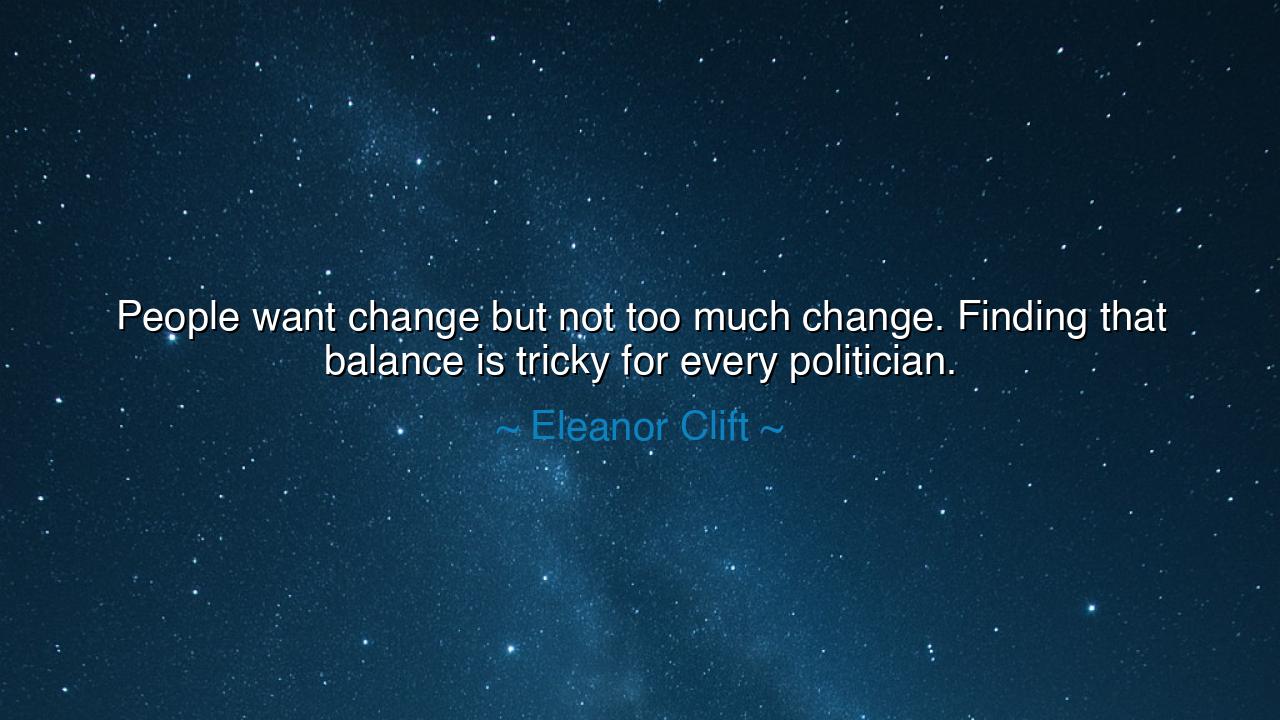
People want change but not too much change. Finding that balance
People want change but not too much change. Finding that balance is tricky for every politician.






Eleanor Clift, with the clarity of a seer of the public spirit, once spoke the paradox of human longing: “People want change but not too much change. Finding that balance is tricky for every politician.” These words are not mere observation, but wisdom born of the eternal rhythm of history. For men and women cry out against chains, yet tremble when the links are broken too quickly. They yearn for the new dawn, but fear the fire of its rising. Thus, the path of the leader is ever narrow, winding between bold transformation and the comfort of tradition.
To desire change is the nature of the human soul, restless against decay and injustice. Yet to resist too much change is also natural, for the unknown is a vast abyss into which societies may stumble and vanish. The art of governance lies in knowing how far to walk toward tomorrow without losing the steady ground of yesterday. Too little, and the people despair; too much, and they rebel in terror. This is the delicate balance Clift names, the hidden trial that every ruler must endure.
Consider the story of Mikhail Gorbachev, who sought to renew a crumbling Soviet empire with glasnost and perestroika. He gave his people a taste of freedom and reform, yet in their hunger they demanded more than he could control. What began as a careful balancing act soon unraveled into the fall of an empire. Here lies the peril Clift warned of: that even the noblest attempt to guide change may be consumed if the scales tip too quickly from order to upheaval.
So too do we see the lesson in Abraham Lincoln, who moved not with reckless haste, but with measured courage. In the furnace of civil war, he freed the slaves not all at once, but in steps that the nation could bear without breaking entirely. His Emancipation Proclamation was both radical and restrained, a stroke of vision tempered by pragmatism. In his hands, the tricky balance became a weapon of endurance, and the Union was preserved even as the shackles were broken.
Therefore, children of the future, remember Clift’s counsel. To demand change is noble, but to guide it with patience is divine. The leader must be both shepherd and flame: gentle enough to keep the flock from scattering, fierce enough to burn away injustice. Know this truth—too little courage invites stagnation, too much haste invites ruin. But in the sacred balance lies the true art of politics, and the measure of a leader’s greatness.






K9Pham Khiem 9.3
Are politicians underestimating the public’s willingness to accept change, or is there a deeper hesitation tied to comfort with the status quo? The balance between progress and preservation is tricky, but can the public ever fully support large-scale reform if they feel too much is at stake? How can leaders create an environment where significant change feels more like a positive shift rather than a risky leap?
THTrang Huyen
How does a politician decide where to draw the line between the change the people want and what they’re actually ready for? Sometimes, it feels like there’s a disconnect between what’s needed for the greater good and what’s immediately palatable to the public. Should politicians push for more, even if it’s controversial, or should they be more cautious and incrementally build momentum for change?
Nnoname
What’s the best way to measure the ‘right amount’ of change? People often say they want change, but when faced with the consequences of it, they seem hesitant. Can we really expect people to accept big shifts in policy or societal norms if they’re not fully prepared for them? Should politicians prioritize gradual change to make the transition smoother, or is bold reform necessary to achieve progress?
::))
Is it possible for politicians to ever truly meet the demands for change without alienating those who prefer stability? It feels like people want to progress, but they also want to hold on to what’s familiar. How does a leader find the balance between innovation and tradition, especially in a polarized political climate? Is there a way for politicians to push forward without causing too much disruption?
TVCam Tu Vo
How much change is too much for the average person to handle? It seems like society is always asking for progress, but when it comes down to it, there’s often a reluctance to embrace significant transformation. Is this resistance rooted in fear, or is it a more practical concern about the unknown consequences of rapid change? Could politicians do a better job of communicating the need for change without overwhelming their constituents?